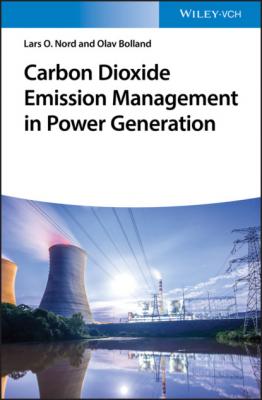Carbon Dioxide Emission Management in Power Generation. Prof. Lars O. Nord
Читать онлайн.| Название | Carbon Dioxide Emission Management in Power Generation |
|---|---|
| Автор произведения | Prof. Lars O. Nord |
| Жанр | Химия |
| Серия | |
| Издательство | Химия |
| Год выпуска | 0 |
| isbn | 9783527826650 |
Organisation and Use of Book
The first chapter gives a general introduction on CO2 emissions and CO2 capture and storage (CCS). CCS also involves both CO2 transport and storage, and although not the focus of the book, Chapter 2 gives an overview related to long-term storage of CO2.
Before covering thermal power plant technologies in Chapter 5, both the fuels used in the power plants, and CO2 and its properties are covered in Chapters 3 and 4, respectively. Chapters 6 and 7 deal with fundamentals of gas separation and plant efficiencies, important topics related to CO2 capture.
The CO2 capture methods are covered from Chapter 8 and onwards, both in terms of gas separation methods, Chapters 9–11, and capture processes integrated in power plants, Chapters 12–14, dealing with pre-combustion, post-combustion, and oxy-combustion capture methods. Absorption is the most commonly used method to separate CO2 from gas mixtures. This method is discussed in separately in Chapter 9, while other methods, such as membranes and adsorption, are lumped together in Chapter 10.
This text was designed to bridge the gap between the many disciplines involved in CO2 capture and is fit for undergraduate students, graduate students, practicing process engineers, and others interested in an understanding and overview of CO2 capture from thermal power plants in particular and of CCS in general. The research in the field is evolving and it is not the purpose of the book to cover all the latest developments and research within CCS. If this was the goal, the book would be outdated already at the time of publishing. For the latest in research, the reader is referred to review and research journal articles.
1 Introduction
1.1 Greenhouse Effect
The temperature in the Earth's atmosphere and at ground level is a result of a complex energy balance between incoming solar radiation energy and outgoing radiation energy from the Earth's surface and atmosphere. This balance varies naturally in daily and annual cycles. There are also variations with long-term cycles, such as the Milankovitch cycles, which are related to the Earth's orbital patterns (Milankovitch 1941). The heat balance is the basis for the temperatures that we have in the atmosphere and at ground level.
In general, the gases present in the atmosphere convert radiation energy into thermal energy – by absorption
